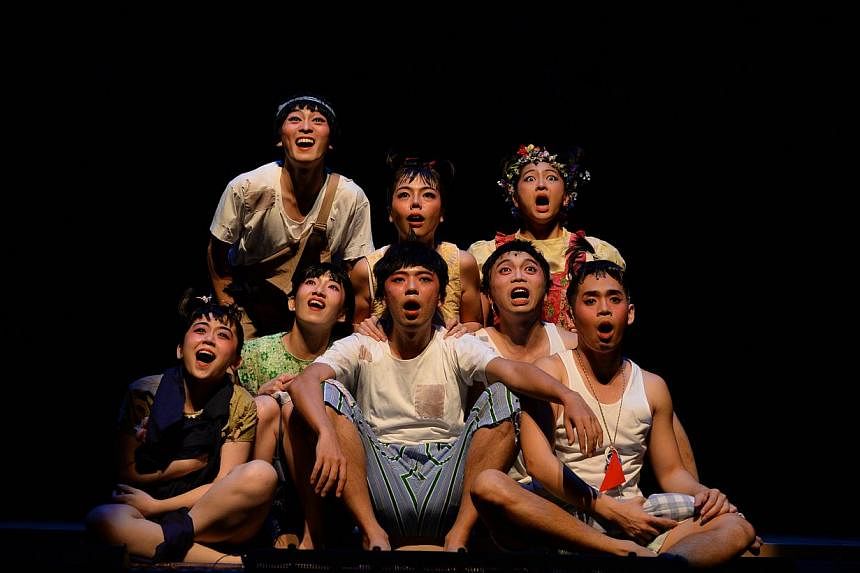The Chinese street opera tradition is often a hereditary, generational art, passed down from master to disciple - who only becomes the master when a level of certain distinction is attained - and then the cycle carries on.
Not unlike Toy Factory Productions' Titoudao, perhaps, which was first staged in 1994 and has since gone through several revivals, each featuring an ensemble cast that draws from each new crop of Singapore theatre performers.
The story itself is a sweet, sentimental one, nostalgic enough to fit into the mould of this year's Golden Jubilee celebrations with its savvy blend of contemporary musical and traditional art form.
Based on the real-life story of playwright-director Goh Boon Teck's mother Oon Ah Chiam (played with great gusto by Audrey Luo), Titoudao follows her journey from rags to uncertain riches as she goes from kampung girl to wayang starlet and then to near-forgotten icon.
This play is intercut with scenes from an actual Hokkien opera that Oon was famous for, in which she plays the mischievous, loyal servant Titoudao who unfailingly serves his master, the poor scholar Ti Boon Long (Timothy Wan), who is rejected by his betrothed Teng Lay Kiao (Rei Poh) but is helped by her sweet, good sister Teng Swee Lian (Trev Neo).
Both Titoudao and Oon carry that same unflagging determination and sunny disposition; as Titoudao staunchly protects his kind-hearted master from thieves and tigers, Oon keeps her head up and defends her family even as her father abandons her, her mother dies and her mother-in-law abuses her.
The parallel stories feed into and reflect each other, as the good-hearted protagonists from each do their best to make their way in the world.
There are certain chunks of Oon's life that are glossed over or left gaping - we are fast-forwarded from her uncertain arrival on the opera stage to almost immediate stardom; Goh also spends a great deal of time painting Oon and her siblings as a rambunctious horde of children and then chooses to have Oon narrate great swathes of her life in future scenes, which means that her story carries a rather uneven emotional investment.
The opera bits fare much better and are great fun to watch, full of unabashed high camp and gleeful cross-dressing. The ensemble spent intensive rehearsals with an actual opera troupe and the effort has paid off - their codified gestures are immediately recognisable, and even the predictable "good triumphs over evil" storyline helps rather than hinders, allowing the endearing main characters several meaty detours before they reach their inevitably happy conclusion.
The live percussion by musician Zhuang Haining also adds a wonderful immediacy to their performances, bringing each line and gesture into sharp rhythmic focus.
This cast has enormous shoes to fill, particularly Luo, who steps into the cavernous footsteps of Pam Oei, who made Titoudao and Oon so completely her own in previous incarnations. But Luo is a very likeable performer, and even if she doesn't quite pull off Oon's transformation into old age, her infecious chili padi nature does make its way into her lively, sympathetic performance.
Each cast member plays multiple roles and Rei Poh, in particular, milks his delightfully villainous character of the spoiled, scheming sister Teng Lay Kiao to great comic effect, and channels a lighter version of J.K. Simmons' sociopathic, abusive Whiplash music teacher as an un-pleasable street opera shifu.
The rest of the cast is earnest and energetic, if perhaps lacking a bit of the je ne sais quoi that could have made this production really come together.
Some performers easily overshadow others in terms of presence and flair. And often, many of the performers sound uncomfortable handling a mix of Singlish, dialect, accents and colloquialisms - the combination, perhaps a problem with the script, sounds unnecessarily forced; it attempts to capture the diversity of the Singaporean vernacular but ends up being a strangely muddled pastiche.
Titoudao arrived on stage at a time where Singapore theatre was hitting its stride, but has continued to beat the same drum long after, echoing the need to preserve our intangible heritage, to elevate our fading past.
This rallying cry does feel heavy-handed and didactic at times in Oon's story - but in the opera segments, the magic of street opera speaks for itself, with every toss of a "water sleeve" (shui xiu) or coy sideways glance conveying an enormous depth of feeling.
As a young girl I watched a great deal of Teochew opera because of my father's love for the genre. The stories often follow the same arc and use the same tropes, as they do here. Character motivations were obvious, as were the binaries of good and bad. But somehow these elements never seemed to grow old. And to see them live again in Titoudao, even with its flaws, is a good reminder of how the magic of the theatre transcends form - and age.
Follow Corrie Tan on Twitter @CorrieTan
book it
TITOUDAO
Where: Drama Centre Theatre
When: Till March 14. Tues to Fri at 3pm and 8pm, Sat and Sun at 3pm. No shows on Mon
Admission: $49 to $69 from Sistic (excludes booking fee; call 6348-5555 or go to www.sistic.com.sg)
Info: Performed in Mandarin, Hokkien and English with English surtitles


